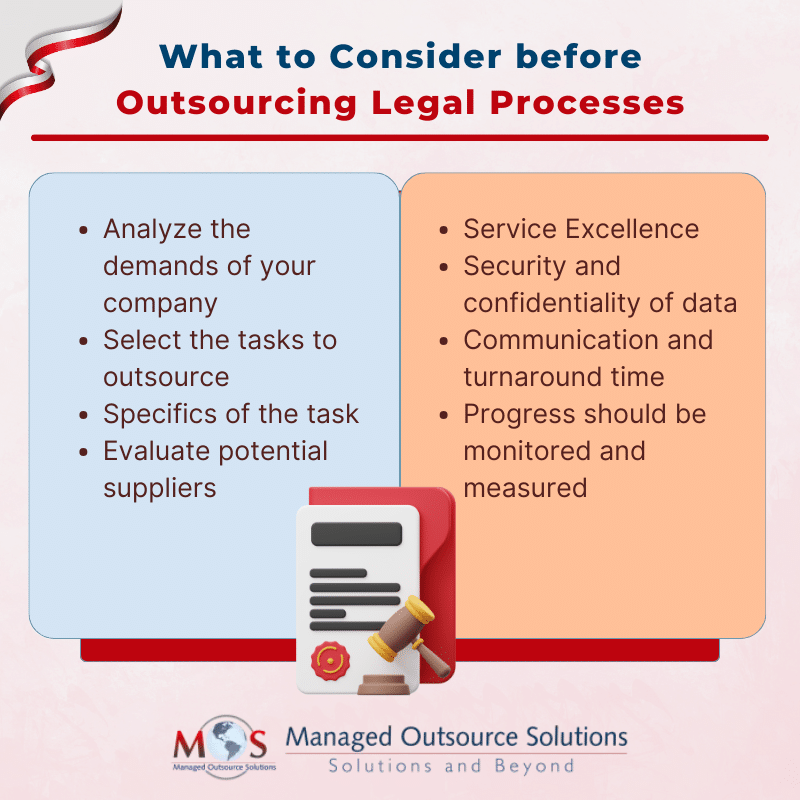Running a successful legal practice involves a long list of must-do activities, no matter how hard you and your team work. However, by utilizing legal process outsourcing to grow your business, you may address all of these activities more quickly, wisely, and effectively. Attorneys and other legal professionals can concentrate more on their most important jobs by outsourcing legal work. Outsourcing is a practical approach to handle the numerous responsibilities that compete for your attention when practicing law and to avoid getting overworked,. Any repetitive, laborious tasks consuming significant time can be handled by a legal process outsourcing service. You can save time and money by using these services, which relieve you of these responsibilities at a reasonable cost.
What Is Legal Process Outsourcing?
Legal process outsourcing is the practice of law firms assigning portions of their attorneys’ workloads to a reliable outsourcing company. They can save time and money in this way, which will enable them to better serve their clients and enhance their reputation. Administrative duties, such as making appointments, sending bills, and keeping track of time entries, document management and so on, are some of the most common tasks that are outsourced.
According to an article published by GlobalNewsWire in 2019, the global legal process outsourcing market is estimated to expand at a compound annual growth rate of 31.8% from 2019 to 2025. The market is projected to reach $35.9 billion by 2025.
How to Outsource Legal Processes Efficiently
Take into consideration the following while choosing a good outsourcing firm:
- Analyze the demands of your company: When it comes to outsourcing legal processes, there are many choices. Not all of them, though, will be beneficial to your company.
Start with asking yourself these questions: - Which projects require a lot of staff time yet don’t always need to be finished internally?
- Is it necessary for any of the employees of the third-party provider to be present in your office?
- Do you require assistance going to court?
Finding the ideal service provider to meet your needs is possible once you’ve identified them.
- Select the tasks to outsource: Delegation is the foundation of outsourcing. You should take your time in determining which jobs are appropriate to assign to an outside service provider. You could inquire about which tasks consume time, which are not cost-effective, and which don’t require internal completion.
- Specifics of the task: Make sure you have a clear grasp of the specifics of the job that needs to be done before outsourcing any legal work. What kind of legal work is needed for the project? How intricate will the situation be? Which documents require drafting? All of these are crucial facts to consider prior to initiating the outsourcing procedure.
- Evaluate potential suppliers: After determining which legal services you require an outsourcing firm to handle, you can evaluate potential suppliers. Be careful to choose a supplier who will effectively help your company achieve its objectives.
- Service excellence: Examine the provider’s background to see if they have the systems and tools necessary to provide high-quality services. Inquire about how they conduct legal research, verify the authenticity of documents, and make sure deadlines are fulfilled. This guarantees quick reaction times and constant service quality while assisting you in keeping overall expenditures under control.
- Security and confidentiality of data: When outsourcing legal processes, data security and confidentiality are important considerations. Sensitive information is frequently involved in legal situations, and the highest care is needed to protect client privacy and adhere to applicable requirements. To make sure that all private information is protected during the engagement, it is critical to carefully assess the outsourcing company’s data protection policies, encryption methods, access restrictions, and compliance procedures. A degree of confidence that is essential to any successful partnership can be established by both sides having clear expectations regarding secrecy.
- Communication and turnaround time: If you need legal services right away, make sure you are aware of the provider’s communication style and response time. This will guarantee that your legal documents arrive on time and that you can easily get in touch with the supplier with any questions or concerns. A successful partnership requires effective communication between your in-house staff or you and the outsourcing agency. Establishing precise expectations and timeframes up-front can help you guarantee that the project is completed on schedule and that any potential issues are resolved as soon as possible. To keep everyone in the loop, regular updates and progress reports should be shared.
- Progress should be monitored and measured. The purpose of legal process outsourcing is to assist your legal practice in becoming more capable and efficient. How well your legal process provider is fulfilling your needs and expectations should be monitored and measured. This guarantees that the legal process outsourcing services you are using are not a waste of time or money.
Do you want to optimize your legal practice’s efficiency and effectiveness through outsourcing services?





